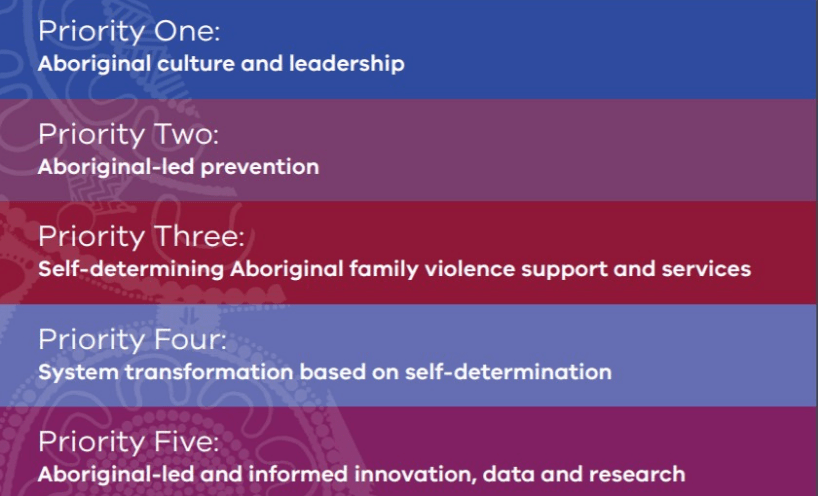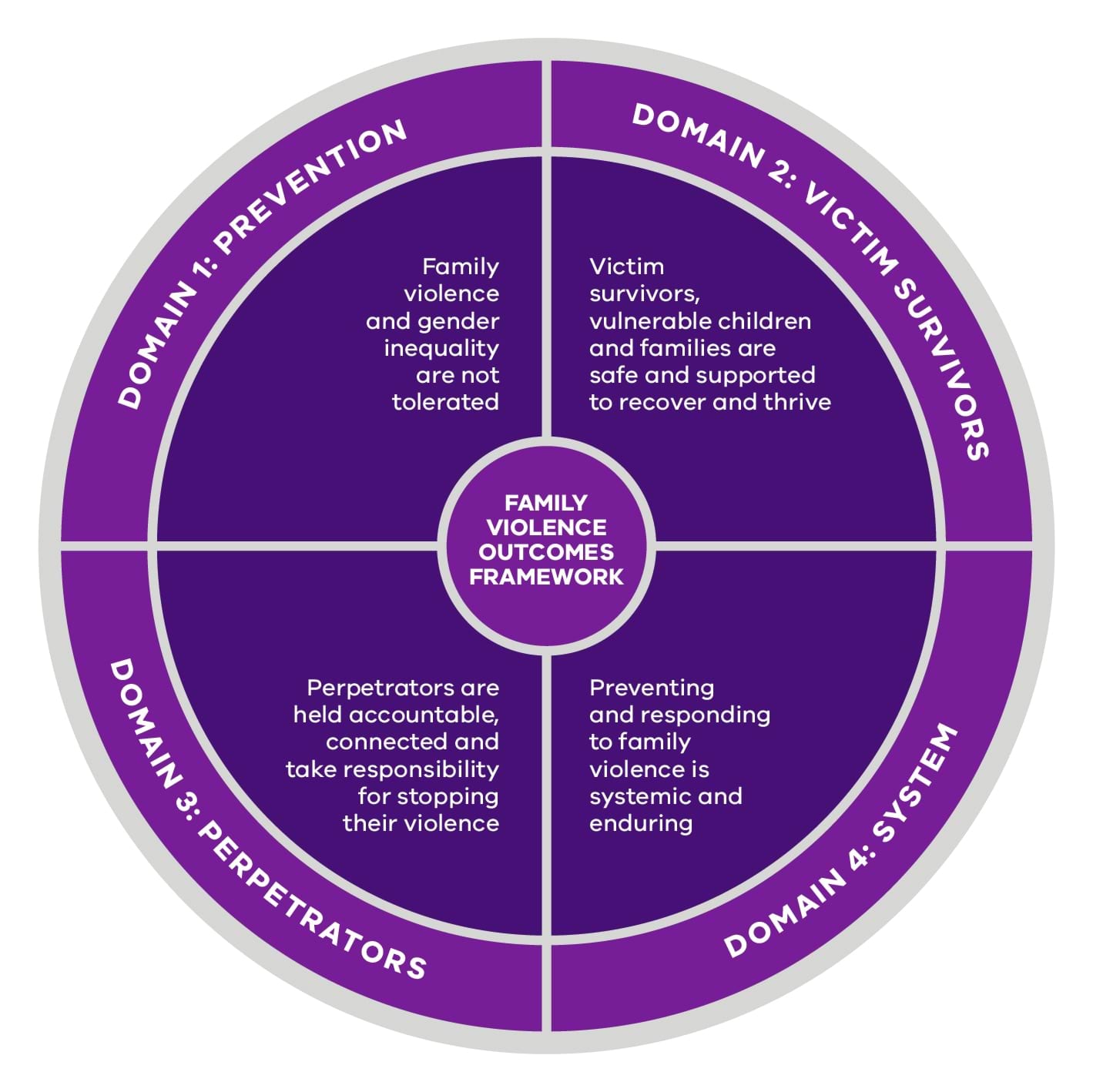Building momentum
Dhelk Dja is the only enduring Aboriginal-led strategy to address family violence in the country.
We are committed to a community-led response to end family violence against Aboriginal people, underpinned by self-determination.
We recognise that family violence is not part of Aboriginal culture and that family violence against Aboriginal people is perpetrated by both non-Aboriginal and Aboriginal people.
We acknowledge that colonisation, dispossession, child removal and other discriminatory government policies have resulted in significant intergenerational trauma, structural disadvantage and racism with long-lasting and far-reaching consequences.
Dhelk Dja: Safe Our Way – Strong Culture, Strong Peoples, Strong Families 2018-2028 is the key Aboriginal-led Victorian Agreement that commits Aboriginal communities, Aboriginal services and government to work together and be accountable for ensuring that Aboriginal people, families and communities are stronger, safer, thriving and living free from family violence.
Dhelk Dja sets out six guiding principles to achieve this vision:
- self-determination
- collaboration and partnerships
- strengths based
- culturally and trauma informed, resilience and healing-based approaches
- safety (cultural, physical and community)
- accountability, transparency and honesty of all parties
The Dhelk Dja definition of family violence:
- includes an acknowledgement of the impact of violence by non-Aboriginal people against Aboriginal partners, children, young people and extended family on spiritual and cultural rights
- notes that it manifests as exclusion or isolation from Aboriginal culture and/or community
- includes elder abuse and the use of lateral violence within Aboriginal communities
- emphasises the impact of family violence on children
Dhelk Dja Partnership Forum
The Dhelk Dja Partnership Forum and its members are the individual and collective champions and strategic leaders overseeing the Dhelk Dja 10-Year Agreement. It is their responsibility to work closely with the community and stakeholders to implement Dhelk Dja and ensure that the principles of self-determination are at the heart of the Partnership Forum’s work.
The Partnership Forum, which meets three times a year, is the mechanism through which the Agreement comes to life. The agenda for each meeting reflects both the lived experience and the many voices and stories of Aboriginal people living across Victoria.
Dhelk Dja Agreement
The Dhelk Dja Agreement commits to the development of three-year action plans to articulate the critical actions and supporting activities required to progress the Dhelk Dja Agreement’s five strategic priorities.

Each of these priorities recognise the need to invest in Aboriginal culture, leadership and decision-making as the key to ending family violence in Victorian Aboriginal communities.
The Dhelk Dja 3 Year Action Plan 2019-2022 is providing a strategic framework for the implementation of significant priority investments.
In this video, Aboriginal Victorians explain why the Agreement is important and how the community is working together to deliver it.
Dhelk Dja: Safe Our WayDhelk Dja: the symbolism in the image
Dhelk Dja are the Dja Dja Wurrung words for ‘good place’ pronounced ‘delk ja'.
The Dhelk Dja artwork in this video represents the 11 Dhelk Dja Action Groups that are working with Aboriginal communities to address family violence.
Creating the Dhelk Dja artwork by Trina Dalton-OogjesProgress since 2016
The key Dhelk Dja activities which have been delivered since the Royal Commission are grouped here into four areas.
Delivery to 2023
Activities for 2020-2023 will continue to progress Dhelk Dja's family violence reforms. We have grouped the planned actions for this priority under four headings
Connecting the Dhelk Dja Agreement across the reform
The Dhelk Dja Agreement recognises the need to respond to all forms of family violence experienced by Aboriginal people, children, families and communities.
The definition recognises that the cycle of family violence brings people into contact with many different parts of the service system.
Efforts to reduce violence and improve outcomes for Aboriginal people and children must therefore work across the family violence services:
- police
- the justice system and the courts
- housing and homelessness services
- child and family services
- child protection and out-of-home care
- health, mental health, and substance abuse
The Dhelk Dja Agreement connects across the breadth of reform activities. For example:
The Orange Door network
- Three Aboriginal access points are being delivered to complement The Orange Door network at Mallee, Barwon and Peninsula Bayside areas with the first due to be established in mid-2021.
Primary Prevention
- Primary prevention campaigns delivered by Respect Victoria will include a specific campaign for Aboriginal Victorians.
Housing
- Family Safety Victoria are increasing accommodation options for women and children escaping family violence.
- Department of Families, Fairness and Housing are supporting Aboriginal people who are homeless or at risk of homelessness through the new Victorian Aboriginal Housing and Homelessness Framework, Mana-na worn-tyeen maar-takoort: Every Aboriginal Person Has a Home. The framework will build a new approach to ensuring Aboriginal Victorians have safe, secure and stable housing.
Victoria Police
- Victoria Police are improving how they capture data through a new methodology and a compliance framework.
- The framework will standardise how Victoria Police measures Standard Indigenous Question (SIQ) compliance against legislation and policy requirements.
Legal Assistance
- Increased referrals for legal support through Djirra.
- A formal referral pathway between The Orange Door network and Djirra was finalised in July 2020 to provide legal advice and support.
Courts
- Court Services Victoria has implemented Umalek Balit, a dedicated Aboriginal family violence support program, where women’s and men’s practitioners work with Aboriginal People to guide them through the court experience.
- This includes offering culturally relevant, non-legal expertise regarding family violence matters.
Reform-wide priorities
Activities to deliver a community-led response to end family violence against Aboriginal people are informed by the reform-wide priorities of intersectionality, Aboriginal self-determination and lived experience.
Intersectionality
The recognition in the Dhelk Dja Agreement of the need to respond to all forms of family violence experienced by Aboriginal people supports an intersectional approach to the delivery of the reform.
This approach must value the strength, knowledge and rich diversity of Aboriginal people, families and communities:
- Aboriginal people with disabilities and mental health issues
- LGBTIQ+ people
- Elders and older people
- children and young people
- people in or exiting out-of-home care
- people leaving State Government services such as prisons
- people living in rural and regional areas
- families comprising Aboriginal and non-Aboriginal family members
For example, Family Safety Victoria funded six Aboriginal Community Controlled Organisations to undertake Rainbow Tick Accreditation and a Statewide Rainbow Tick Project Worker to support Aboriginal services' efforts towards accreditation.
This initiative builds and supports collaborative working relationships between LGBTIQ+ specific services and provides advice on culturally-appropriate content for the workforce development aspect of accreditation.
Aboriginal self-determination
We heard in our consultations with communities that to support Aboriginal self-determination it is important to embed Dhelk Dja across the family violence sector. Dhelk Dja is best supported through a holistic whole-of-community approach.
Aboriginal members of the Dhelk Dja Partnership Forum developed and agreed operating guidelines for the Dhelk Dja fund. This included prioritising funding streams and setting evaluation criteria to ensure that Aboriginal organisations are prioritised to deliver Aboriginal family violence services.
Further activities include:
Lived experience
Including the knowledge and insight of Aboriginal people with lived experience of family violence ensures the reform meets the needs and aspirations of the Victorian Aboriginal community, including in the design, delivery and evaluation of services.
Dhelk Dja Partnership Forum membership is representative of the Aboriginal community and Aboriginal family violence sector.
The Aboriginal community in Victoria is represented on the Victim Survivors' Advisory Council.
Measuring outcomes
Family Violence Outcomes Framework
Activities in this priority area contribute to achieving outcomes against all the Family Violence Outcomes Framework domains:
*We acknowledge that while the Family Violence Outcomes Framework references the term ‘perpetrators’ the Nargneit Birrang Family Violence Holistic Healing Framework prefers use of the term ‘person/people who use violence’.
Royal Commission recommendations
The Victorian Government has committed to implement all 227 recommendations from the Royal Commission into Family Violence.
Of the recommendations still in progress, five relate to Dhelk Dja.
Summary of activities to 2023
Updated
